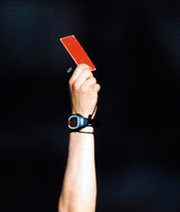
인간은 실수를 통해 진실을 배워간다.
다른 사람들에게 부정적인 영향을 끼칠 경우에도 실수를 저지르는 것이 필요한가? 독서, 학습, 경험 또는 관찰에서 얻은 논리와 예를 가지고 당신의 주장을 입증하시오. -SAT Essay 주제
[학생 작문] [1] All human beings make at least one mistake in their lifetime. [2] At certain times one should avoid mistakes at times mistakes can be made at any [3] certain moments. Ironically, mistakes that results in negative consequences to others are very important as well. This can be clearly [4] shown at 2002 FIFA World Cup when the referees made slight mistakes that had brought negative [5] conclusion and crucial [6] [7] at the same time.
[8] One example was when Totti received [9] red card, [10] the soccer match between Korea · Italy, there has been a lot of discussions [11] whether the referee made [12] a right decision to [13] expel Totti for overaction. Nobody knows whether Totti’s fall was just or unjust but this notorious [14] · dramatic “moment” [15] but there are people claiming that [16] referee made a big mistake. The referees are experts and they can make [17] mistake as well when [18] other referee didn’t see the ball was hit on the Spanish’s player’s head. But this taught other countries a lesson referee’s mistakes from.
Another mistake was the offside goal between Spanish [19] · Korea. A lot of European fans were not satisfied with the offside decision and [20] predicting as the referee’s mistake. Once again, there can be moments when they make mistakes [21] because they are professional and this can happen to any matches as well.
From the first World Cup to the recent World Cup in Germany, there are referees that [22] had made mistakes [23] by missing the offside · other faults. Even though the referees can make mistakes, it is acceptable for their mistakes since all human beings make mistakes as well.
|
[Comment] You seem to have a consistent flow of thought, but you really don’t answer the question. I think you must be quite a soccer fan. Unfortunately, it doesn’t seem to fit with the question. The questions asks for a more universal approach and you are focusing on the rules and regulations of a game officiated by professional referees.
So why doesn’t it work? Because the essay fails to address the issue of what is learned from these mistakes. Remember that we LEARN the truth about ourselves through mistakes. You seem to assert that we learn that referees are humans, too, and that as professionals, they can also make mistakes, but ask yourself: So what? What’s the deeper purpose? What’s the meaning of this? Finally, check your spelling of “referee” and note that you have to describe the particular details of the game to let the general reader know the point you are making.
사고의 흐름이 일관된 에세이지만 주어진 질문에 제대로 답하지 않고 있습니다. 글의 내용으로 보아 당신은 굉장한 축구 팬인 것 같습니다. 그러나 안타깝게도 축구는 질문에 적합하지 않은 소재 같습니다. 질문은 좀더 보편적인 접근방식을 요구하고 있지만 당신은 전문 심판이 제재하는 경기의 룰과 규정에 초점을 맞추고 있습니다.
그리고 이 에세이는 실수로부터 무엇을 배우는지에 대한 문제를 다루지는 못하고 있습니다. 우리는 실수를 통해 우리 자신의 진실을 배워간다는 점을 기억하세요. 당신은 심판도 역시 인간이기에 전문가지만 실수한다는 점을 우리가 배운다고 주장하는 것처럼 보입니다. 하지만 자문해보세요. 그게 뭐 어떻다는 것인지. 무엇이 진정한 목적이며, 그것의 진정한 의미는 무엇인지. 마지막으로 어떤 경기의 특정한 기술을 다룰 때는 그것에 대해 상세하게 설명해야 합니다. 그래야 독자들이 당신이 말하려는 요점을 알 수 있기 때문입니다.
















